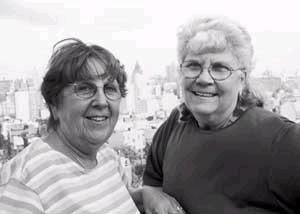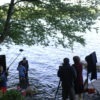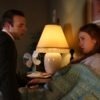
Grand Dames
Written by Asa Pittman | Posted by: Anonymous
Wowing audiences at virtually every indie film fest, director Deborah Dickson’s documentary, "Ruthie and Connie: Every Room in the House," takes on HBO.
"It wasn’t really my idea," director Deborah Dickson said of producing the documentary sensation, "Ruthie and Connie: Every Room in the House." According to her, Donald Goldmacher, a NY psychiatrist, conceived the documentary about Jewish, lesbian grandmothers. A New York City resident, Dickson originally thought the film’s subject matter mundane: "I didn’t think that it was a new topic." Goldmacher’s pitch, however, was compelling:
Ruth Berman and Connie Kurtz, both married, Jewish mothers from Brooklyn, become neighbors and friends in 1959. Fifteen years later, friendship blossoms into love and the two previously conventional housewives leave their husbands and children to move in together. Homophobia threatens to sever the union, but love prevails, and the couple survives to become activists, grandmothers and life-long partners.
Intrigued by the tale, Dickson agreed to direct the documentary about the women. Getting access to them would be easy; Goldmacher was a former neighbor of Ruthie’s, his older sister was her long-time friend.
Teaming up with Dickson in 1990, Goldmacher, who had grown up across the street from Ruthie, had wanted to make the documentary for years. After meeting Ruthie and Connie, Dickson could see why — they were made for pictures. "It’s not about coaxing them; they are such characters" she said of putting the gregarious pair in front of a camera. Known for promenading in the Gay Pride Parade and hoofing it on the Coney Island Boardwalk, Dickson knew audiences would feel as she did about the swinging seniors. "I just fell in love with them," she said, "They are so open, so warm, so funny."
In person Ruthie and Connie exuded charm and wit, but Dickson worried that on film their story wouldn’t convey the same energy. Making audiences feel Ruthie and Connie’s years of friendship, love, heartbreak and redemption presented a challenge. A former fan of cinema verité, Dickson was an expert on capturing life in the present — resurrecting the past was another matter. "I wanted to bring [the story] into the present, but I didn’t want to do straight sit down interviews," Dickson said. A discussion, not a monologue, Dickson decided, would portray the past with immediacy and creativity. In the movie, group chats between family, friends and neighbors fill the audience in through multiple perspectives of Ruthie and Connie’s lives.
Shooting Ruthie and Connie’s daily life, though easier to record than their past, also required some planning. "Sometimes they’d call and ask us if we wanted to film an event," said the director. "Certain events in their lives we knew we wanted to cover." Learning that the women had led relationship workshops for gays and lesbians in the past, Dickson asked Ruthie and Connie to host one for the movie. The workshop, which advised homosexuals on dealing with the aftermath of "coming out," "exemplified how painful it is to be gay in a straight world," said Dickinson. It also echoed a painful time in Ruthie and Connie’s relationship. Even after moving in with Connie, Ruth, embarrassed and ashamed, denied her homosexuality publicly, going so far as to put name plaques on her and Connie’ bedroom doors to maintain a façade of platonic friendship. Recovery from a near fatal illness she believed caused by a life of secrecy convinced Ruthie to embrace her sexuality and live openly as Connie’s lover. Together, Ruthie and Connie "came out" to millions as successful plaintiffs against the New York City Board of Education in a suit for domestic partner benefits.
Ruthie and Connie’s passion for social activism, Dickson revealed, had enticed her to do the project. "I was interested in the subject from a political point of view." Taking sporadic breaks from "Ruthie and Connie" during 11 years of filming, Dickson explored her favorite film themes of civil rights and justice through other projects, directing a PBS television program on policy maker, Gore Vidal, and an Academy award nominated documentary on illiteracy in the Mississippi Delta, "Lalee’s Kin: The Legacy of Cotton." In January 2001, she edited "Lalee’s Kin" and "Ruthie and Connie" concurrently, and by January 2002, "Ruthie and Connie" was finished.
Still reeling from the buzz around "Lalee," "Ruthie and Connie’s" February 2002 premiere at the Berlin Film Festival would leave Dickson with two award-winning documentaries on her hands. "If they see ["Ruthie and Connie"], they love it," Dickson said of festival audiences. Winning six best documentary audience awards in a year, "Ruthie and Connie" has thrilled indie fans worldwide. The film’s more than 30 international screenings have included showings from Seattle to New York, and several overseas venues such as Australia, Bohemia, Portugal, Germany and the Balkans. Fifteen screenings are scheduled for March 2003, several of them in Northeast U.S.: The Vermont Women’s Festival; The Maine Jewish Festival; The Green Mountain Film Festival; The Hartford Jewish Film Festival; and Newfest Festival in Brooklyn.
And wherever the film goes, its stars follow. "[Ruthie and Connie] love going to festivals," Dickson revealed. Though pleased with the documentary about their lives, it’s not vanity or pride that keeps the ladies on the road, said the director, but a sense of duty. Each screening provides a platform from which Ruthie and Connie promote gay rights. Influenced by Ruthie and Connie’s whirlwind, Dickson happily admitted that the film had taken on a political agenda that she hadn’t anticipated in the beginning: "What better way to combat homophobia than with these two absolutely delightful women."
With the film’s festival run winding down, Dickson searches for opportunities to spread "Ruthie and Connie’s" message outside of its traditional circles. The film’s festival showings, while extensive, mainly targeted gay, lesbian and Jewish audiences. Dickson conceded that although she hoped the documentary had reached mainstream moviegoers, there was no way to be sure: "I have no idea if we’ve reached those people." In comes HBO. Expressing interest early in the project, HBO will air "Ruthie and Connie," for Gay Pride month in June. Dickson finds the collaboration with the cable goliath thrilling and confusing: "I didn’t think Jewish grannies were sensational enough for HBO."
For more information about the film, visit www.ruthieandconnie.com. Local 2003 screenings to take place: The Vermont Women’s Festival on March 21 - www.womensfilmfestival.org/ The Maine Jewish Festival on March 10 - www.mjff.org/ The Green Mountain Film Festival on March 22 & 29 - www.savoytheater.com/gmff/ The Hartford Jewish Film Festival on March 30 - www.hjff.org/ Newfest Festival in Brooklyn on March 26











